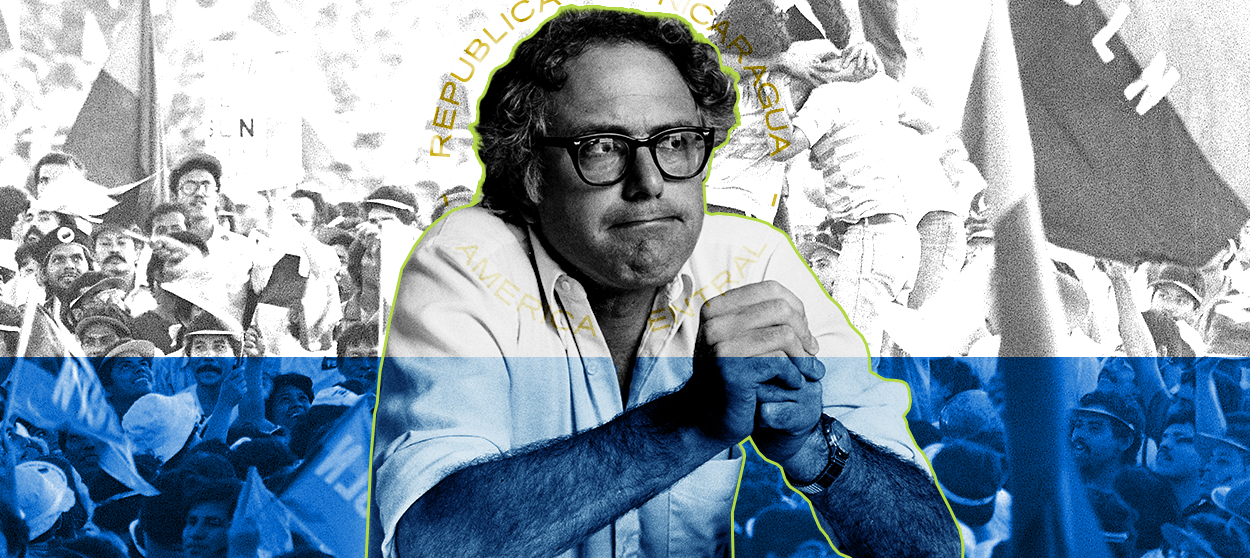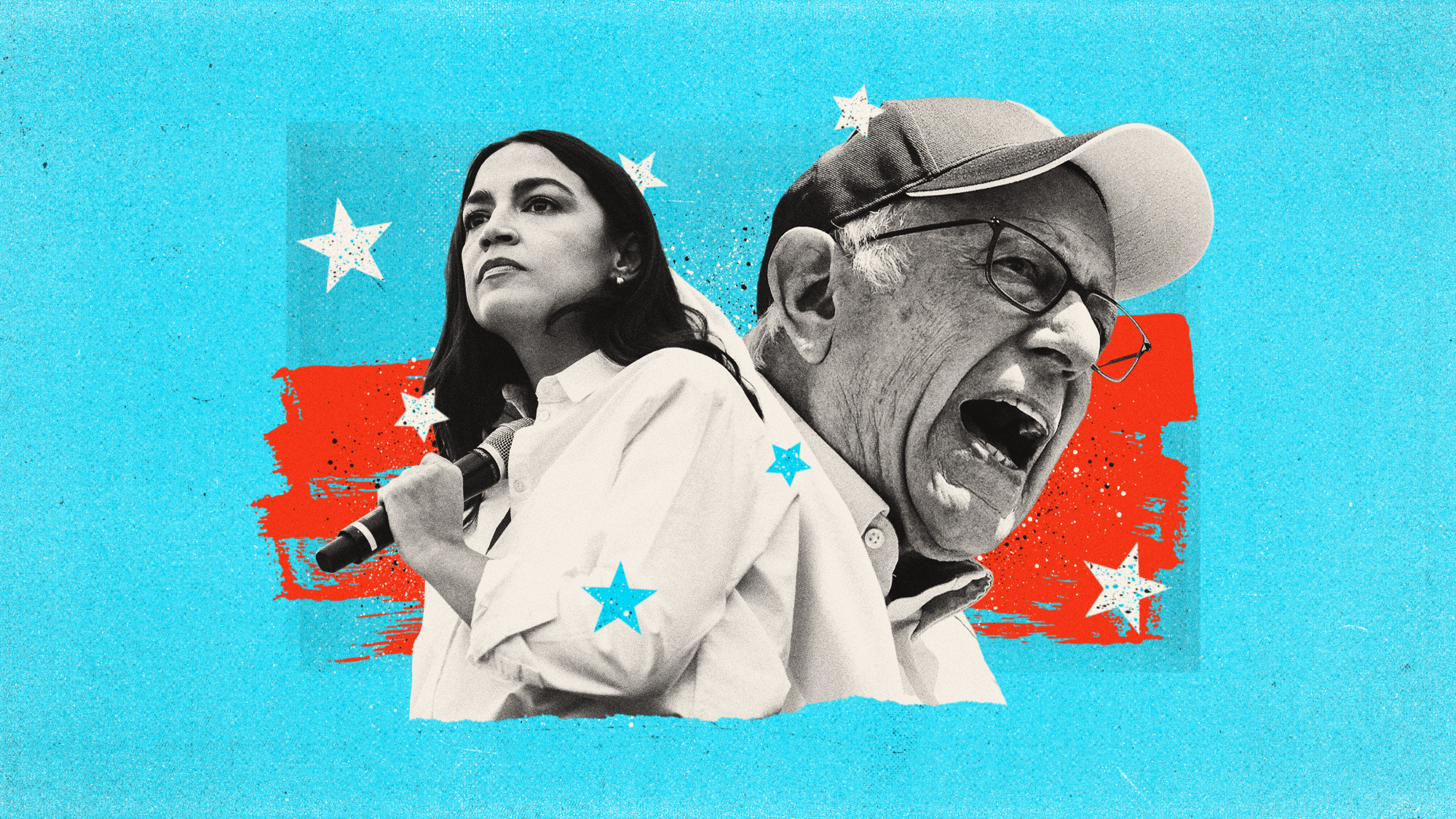Americans should be very concerned about Bernie Sanders' record of opposing mass murder
Is the U.S. supposed to obey international law like some kind of peasant country?


A free daily email with the biggest news stories of the day – and the best features from TheWeek.com
You are now subscribed
Your newsletter sign-up was successful
Bernie Sanders has a problem. As mayor of Burlington back in the 1980s, he attacked the foreign policy of the Reagan administration in Latin America, and even briefly toured Nicaragua in support of its Sandinista government. He was reportedly present at a rally in Managua where protesters chanted anti-American slogans — which is deeply concerning, writes New York magazine's Jonathan Chait.
Quite right. Americans of all political stripes should be very concerned about Sanders' anti-mass murder record.
Historical context is important here, as it reveals beyond question the saintly motives of Reagan's foreign policy team. From 1936-1979, Nicaragua was benevolently ruled by the Somoza family, who were friendly to the U.S. and the Nicaraguan working class alike. Their government was not at all corrupt, and in no way did the Somozas accumulate a vast dragon hoard of wealth looted out of the country.
The Week
Escape your echo chamber. Get the facts behind the news, plus analysis from multiple perspectives.

Sign up for The Week's Free Newsletters
From our morning news briefing to a weekly Good News Newsletter, get the best of The Week delivered directly to your inbox.
From our morning news briefing to a weekly Good News Newsletter, get the best of The Week delivered directly to your inbox.
But leftist forces, motivated by nothing more than spite, mounted a guerrilla insurgency in the mid-70s. They took up the mantle of Augusto Sandino, who unfortunately died after slipping on a banana peel during earnest peace talks with Anastasio Somoza García in 1934, who had offered free puppies and ice cream to all leftist factions. After years of hard fighting, these Sandinistas finally overthrew the government of Anastasio Somoza Debayle (son of the first Somoza) in 1979.
Conservative forces launched a counter-revolution (thus Contras, for Contrarrevolución), and Reagan naturally supported them with money and weapons, as all right-thinking people would have done. Democrats in Congress were inexplicably wary of foreign intervention, and so after they discovered that the CIA was putting Freedom Mines in Nicaraguan harbors in 1984, they banned military aid to the Contras. The administration was forced to turn to selling arms to Iran to finance them.
Naive American leftists like Sanders were outraged by all this. Lacking an understanding of the Soviet menace and the noble beauty of American power, they argued Nicaragua should be left to its own devices, and that the Contra support was creating a humanitarian catastrophe. Sanders even praised aspects of their dastardly red government, like building hospitals and schools (which cut the illiteracy rate from 50 percent to 13 percent), while criticizing others. Simply appalling. As Chait writes, "his defensive comments about a communist regime would help Republicans paint him in the most extreme light."
To be fair, the Sandinistas were not actually communist. And sure, maybe they won free and fair elections in 1984. And perhaps the Contras were terrible at actually fighting, and on occasion brutally murdered a few thousand civilians. Maybe the CIA told even told them to do this as part of a deliberate strategy of terrorism. And yes, the arms sales to Iran were technically illegal, leading to several administration officials being convicted of crimes. (Luckily, President George H.W. Bush stymied this unpatriotic inquisition — into himself, among others — through his pardon power.)
A free daily email with the biggest news stories of the day – and the best features from TheWeek.com
But all that was no reason to be soft on socialism. After all, as Jeane Kirkpatrick argued in 1979 against President Carter's support for removing Somoza, "there is no instance of a revolutionary 'socialist' or Communist society being democratized." It's literally impossible! What's a few tens of thousands of teachers, doctors, nurses, judges, farmers, American nuns, or the rule of law compared to keeping the reds down?
Chait is also correct to be disturbed by Sanders' cranky response to New York Times reporter Sydney Ember. It's simply outrageous for an interviewee to refuse to accept a questioner's framing of the issue. It's not as if she is a political reporter rather than a specialist in Latin America, or evinced a grotesque misunderstanding of Nicaraguan history. After all, as Chait points out, "she had just written a long New York Times story" about the issue, and therefore must have known what she was talking about. When has the New York Times ever supported imperialist war, or rated insults to American pride over the lives and liberty of poor foreigners?
If anything has plagued United States foreign policy over the last 50 years, it is being overly hesitant with the use of military force. Imagine having a commander-in-chief who says things like: "Does the government of the United States of America have the unilateral right to destroy the government of Nicaragua because the president of the United States and some members of Congress disagree with the Sandinistas?" Is the U.S. supposed to obey international law like some kind of peasant country? The very idea shocks the conscience. Bernie Sanders simply cannot be trusted with presidential power.
Ryan Cooper is a national correspondent at TheWeek.com. His work has appeared in the Washington Monthly, The New Republic, and the Washington Post.
-
 Is Andrew’s arrest the end for the monarchy?
Is Andrew’s arrest the end for the monarchy?Today's Big Question The King has distanced the Royal Family from his disgraced brother but a ‘fit of revolutionary disgust’ could still wipe them out
-
 Quiz of The Week: 14 – 20 February
Quiz of The Week: 14 – 20 FebruaryQuiz Have you been paying attention to The Week’s news?
-
 The Week Unwrapped: Do the Freemasons have too much sway in the police force?
The Week Unwrapped: Do the Freemasons have too much sway in the police force?Podcast Plus, what does the growing popularity of prediction markets mean for the future? And why are UK film and TV workers struggling?
-
 The billionaires’ wealth tax: a catastrophe for California?
The billionaires’ wealth tax: a catastrophe for California?Talking Point Peter Thiel and Larry Page preparing to change state residency
-
 Mamdani vows big changes as New York’s new mayor
Mamdani vows big changes as New York’s new mayorSpeed Read
-
 Bari Weiss’ ‘60 Minutes’ scandal is about more than one report
Bari Weiss’ ‘60 Minutes’ scandal is about more than one reportIN THE SPOTLIGHT By blocking an approved segment on a controversial prison holding US deportees in El Salvador, the editor-in-chief of CBS News has become the main story
-
 Has Zohran Mamdani shown the Democrats how to win again?
Has Zohran Mamdani shown the Democrats how to win again?Today’s Big Question New York City mayoral election touted as victory for left-wing populists but moderate centrist wins elsewhere present more complex path for Democratic Party
-
 Millions turn out for anti-Trump ‘No Kings’ rallies
Millions turn out for anti-Trump ‘No Kings’ ralliesSpeed Read An estimated 7 million people participated, 2 million more than at the first ‘No Kings’ protest in June
-
 Ghislaine Maxwell: angling for a Trump pardon
Ghislaine Maxwell: angling for a Trump pardonTalking Point Convicted sex trafficker's testimony could shed new light on president's links to Jeffrey Epstein
-
 The last words and final moments of 40 presidents
The last words and final moments of 40 presidentsThe Explainer Some are eloquent quotes worthy of the holders of the highest office in the nation, and others... aren't
-
 The anger fueling the Bernie Sanders and Alexandria Ocasio-Cortez barnstorming tour
The anger fueling the Bernie Sanders and Alexandria Ocasio-Cortez barnstorming tourTalking Points The duo is drawing big anti-Trump crowds in red states
